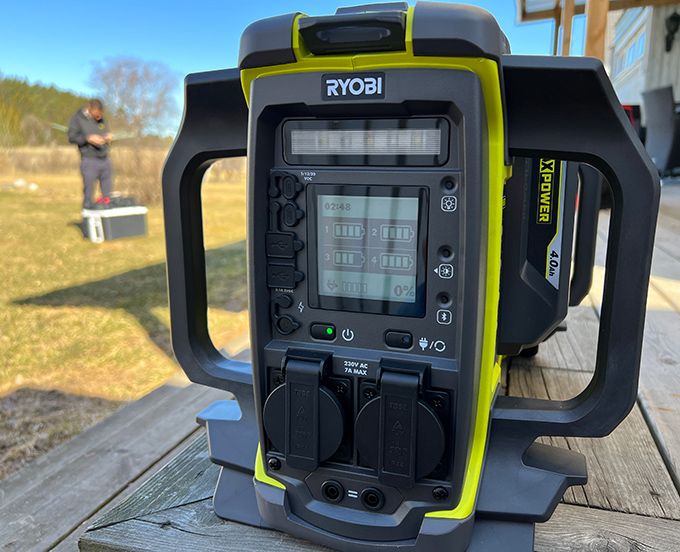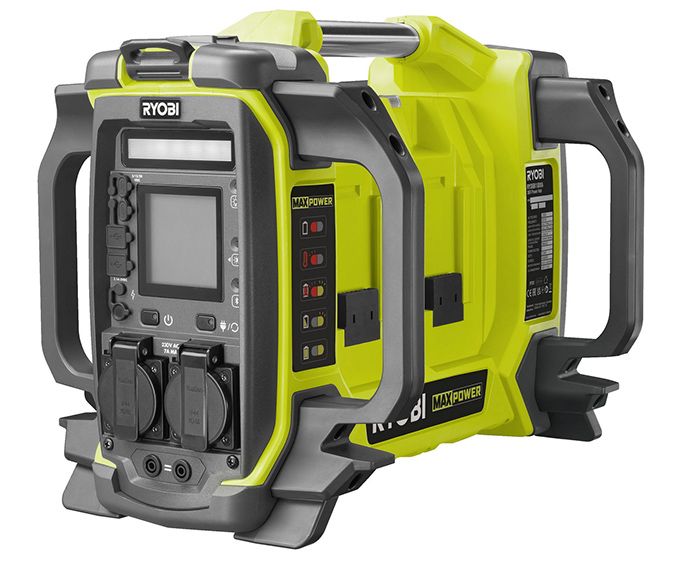Ryobi’s battery system Max Power uses 36. So far, we have tested, among other things, lawn mowers and chainsaws based on the platform. The manufacturer also has a simple inverter that allows you to convert 36V dc to 230V ac (standard wall socket), but it will of course be limited in power. An alternative for those of you with greater ambitions, and who have already gone all in on the Max Power series, is this monster. A battery-powered power plant with 1,600 watts of power.
Rating 2.5 out of 5
Opinion
A strange and limited battery-powered power plant that could have been interesting if there were more functions and better possibilities when it comes to charging. However, Elverket delivers stably as it promises and if you belong to the in our eyes narrow target group, it definitely does the job.
Positively
- Lots of usb outlets
- Child-friendly
- Can be connected in parallel for higher power
- Pure sine wave
Negative
- Expensive solution
- Only charge via 36 volts
- No 12 volt output
Ryobi Powerhub feels really solid with proper carrying handles. Color and shape match the rest of their gadgets in the series. There are also brackets for carrying straps, so you can carry around the machine like an old one boom box.
Lots of usb ports but why not 12V? The test kit contains two 36-volt batteries, but you can also buy the power plant separately if you have batteries lying around. Powerhub can be powered on 1-4 batteries and it is no problem to “hot swap”. On the screen located in the front, you see the current charge status and what percentage you load the system with. Here are also all connections; two 230 volt ac sockets (max 7 amps), four usb-a ports and two usb-c ports. However, 12-volt car sockets are missing, which is a shame.
We connect a work lamp and an element that together load the Ryobi power plant with just over
1,500 watts (6.74 amps measured). The voltage is stable at 228 volts and the screen in the front shows that we load the unit to 96 percent. Now a discreet fan is activated for short periods regularly, at the same time as the battery meter drops alarmingly fast. But of course it works and the frequency is stable. The unit delivers a clean sine curve, so you can also connect sensitive equipment.
Charge the batteries on the power plant
If you do not want to use one / several external chargers when it is time to charge the batteries, you can charge them directly at the power plant. It comes with a 36V charger that you easily connect, this then charges one battery at a time. The sad thing is that the unit has no other option to charge, for example if you have a small solar panel you want to use, or if you want to put it on charge in the car. It is very clear that Ryobi only runs on 36V and 230V, probably to save money.

If you buy a Powerhub without batteries, the device costs SEK 9,000. If you also buy four 5Ah batteries, you are up to an additional SEK 10,000. For that money, you get a really cool Power station, which is a bit the same as this unit. We simply have a hard time understanding who the target group really is.
Do not miss: M3 tests Ryobis One + battery system
If you are a craftsman, you probably already have battery-powered tools and if you want to be able to go off grid for more than a few hours, a petrol-powered power plant is probably preferable. Had this machine been able to be charged on solar cells, offered a 12 volt output, maybe even had a built-in speaker and why not a mosquito killer burner, well then we would have been fully sold on the concept. But of course – you already have a bunch of batteries in the Max Power series and from time to time need to be able to pick out 1,600 watts by emptying the chainsaw and lawnmower on battery, well then it can certainly be interesting, albeit expensive.

Facts Ryobi Powerhub
Manufacturer: Ryobi
Award: SEK 13,779 at Verktygsboden (incl 2 batteries)
Continuous effect: 1 600W
Max effect: 3 000W
Outputs: 2 pcs 230V ac socket (with dust cover), 4 pcs usb-a, 2 pcs usb-c, output for parallel connection
Charge: 36V
Weight (without batteries): 5.7 kg
Other: Built-in work lamp
.
[related_posts_by_tax taxonomies=”post_tag”]
The post Test: Ryobi Powerhub 36V – maximum mobile power with battery-powered power plant appeared first on Gamingsym.
